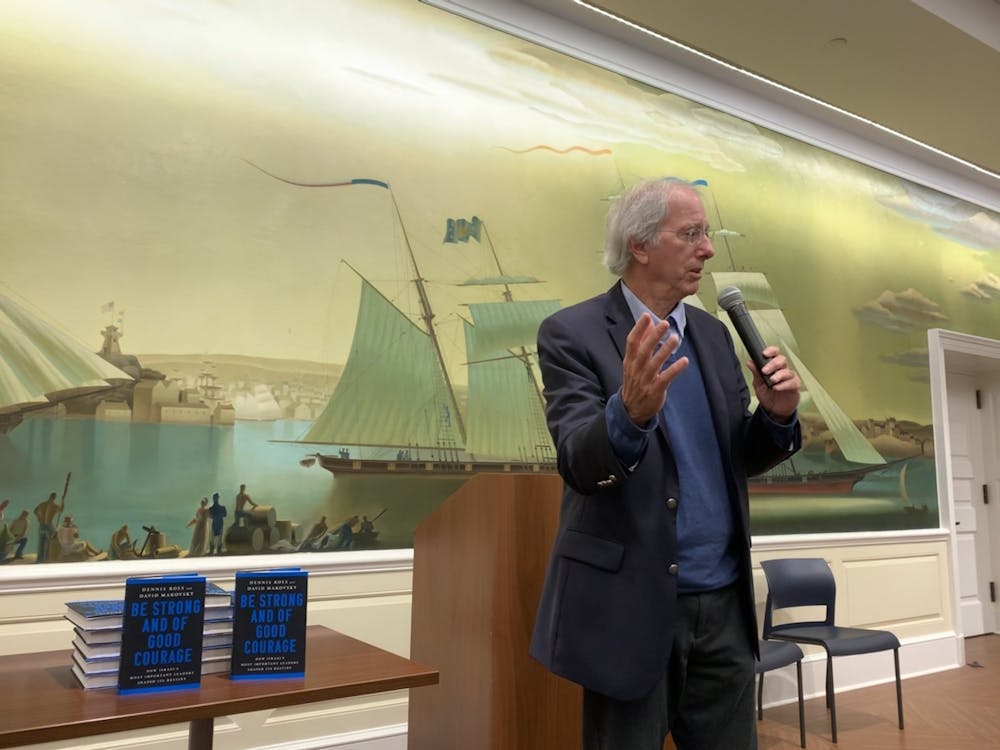Former Ambassador Dennis Ross, an American diplomat who worked under five different presidential administrations, spoke about American foreign policy and the future of the Middle East in the Clipper Room of Shriver Hall on Wednesday. The event was sponsored by Hopkins Hillel, an organization for Jewish students on campus.
In an interview with The News-Letter, Ross expressed the need for constructive conversations surrounding this issue.
“I spent 30 years as a negotiator and a mediator trying to end this conflict,” he said. “I sometimes see some people who almost want to import the conflict from the region to the campus. I want to end the conflict. I don’t want to perpetuate it.”
In an email to The News-Letter, Lior Navon, the Jewish Agency Israel fellow at Hopkins Hillel, wrote that Hillel hoped to engage with students and bring about a productive conversation on issues surrounding Israel and Palestine.
“Ambassador Ross is a unique figure, he is a living legend, he has been involved in many initiatives to bring peace to the Middle East,” she wrote.
Steven David, a professor of International Studies specializing in international security politics, noted how Ross adds a valuable perspective.
“He’s been directing this process under the administrations of many presidents, both Republican and Democrat,” David said. “It’s fair to say no one has more experience than he does in understanding the complexities and challenges of the Arab-Israeli peace process.”
During the event, Ross talked about his new book, Be Strong and of Good Courage, which argues that Israel is headed towards becoming one state for two people and discusses lessons that could be learned from profiles of four past Israeli leaders to prevent that outcome.
In regards to the process of achieving Arab-Israeli peace, Ross stressed that the two states for two people is the only palatable solution but is not possible right now due to divisions between the Hamas and the Palestinian National Authority.
“They essentially reject each other, but, more importantly, Hamas rejects Israel’s existence while PA says they are committed to two states,” he said. “But they don’t accept Israel as a state of the Jewish people, meaning they don’t accept two states for two people.”
He added that Israel today needs to stop building outside the settlement blocs, declare they do not have sovereignty east of the security barrier and open up Area C to Palestinians. He believes that Israel needs to take these steps so that a two-state solution can be possible in the future.
Ross discussed how the U.S. could help the peace process. While he supported U.S. President Donald Trump’s decision to move the American embassy to Jerusalem, Ross criticized the way in which the administration carried out the move. In addition, he noted that Trump has addressed certain needs of Israel while ignoring those of Palestinians.
Ross further criticized the Trump administration’s foreign policy.
“Trump is someone who fits a strain of isolationism that was described as belligerent isolationism, which pretty much wants to withdraw from the world, which doesn’t believe in alliances or values,’” Ross said.
He added, however, that the U.S. must not act as the world’s policeman.
In an interview with The News-Letter, Ambassador Ross further weighed in on foreign policy debate within the U.S. He argued that politicians should not condemn Israel’s occupation policies without criticizing Palestinian violence.
“We need to address the needs and the behaviors of both sides,” he said.
Junior Michael Leff, who helped organize the event, echoed Ross’s sentiments. He is president of the Hopkins American Student Partnership for Israel, a student organization at Hillel that describes itself as a non-partisan, pro-Israel education and advocacy group.
“For true diplomacy to happen, we need to consider the needs of both sides,” he said. “We need... to understand the importance of leadership and putting country over party — and that applies to both Israeli and American politics.”
Freshman Dominique Varier stated that he enjoyed learning about Ross’s perspective.
“I really liked his approach because I could learn about the future of Israel and Palestine, as well as the now,” he said.
Gary Lattin an alum who graduated in 1963, said that he appreciated Ross’s talk.
“The Ambassador characterized the developments very clearly. I’m extremely impressed,” he said. “Hopkins is a fair university; it gives all sides.”
Similarly, junior Maya Fraga commended Hillel for hosting the event.
“It’s important to open up the dialogue about Israel and the Israeli-Palestinian conflict. Especially since it’s so polarized, in order to have a semblance of peace, we have to consider both sides,” she said.





